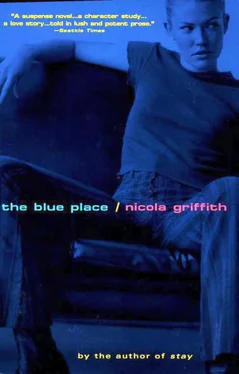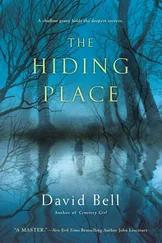Wood is an endlessly adaptive material. You can plane, chisel, saw, carve, sand, and bend it, and when the pieces are the shape you want you can use dovetail joints, tenpenny nails, pegs or glue; you can use lamination or inlay or marquetry; and then you can beautify it with French polish or plain linseed oil or subtle stains. And when you go to dinner at a friend’s house, the candlelight will pick out the contours of grain and line, and when you take your seat you will be reminded that what you are sitting on grew from the dirt, stretched towards the sun, weathered rain and wind, and sheltered animals; it was not extruded by faceless machines lined on a cold cement floor and fed from metal vats. Wood reminds us where we come from.
When I want to use my long muscles, feel arms and legs flex and bend, the sweat run down my neck and get in my eyes, I build something big. Framing in the master suite extension had taken me two weeks, the deck another six days. But after talking to Sweeting, I wanted something more exacting than energetic, something to free my mind.
I had been working for the last two weeks on a chair of English pine. My hand plane slid down the wood, zzst zzst , and buttery shavings curled to the floor. Zzst zzst . English pine is darker than its acid-yellow American cousin, so rich it makes you want to reach out and put it in your mouth. The grain is finer, denser, a little less spongy, such a joy to plane that when I first started working it I often took off more than I needed in the sheer pleasure of watching the blade slide through it. Zzst zzst . The shavings piled up. Sunlight, shivered and greened by the foliage outside the window, warmed the heaps, filling the room with the simple, uncomplicated scent of fresh-cut pine. Zzst zzst . I could feel my face relaxing, the muscles around my ribs letting go.
The phone rang. I listened with only half an ear as the answering machine stopped clunking and the caller started to talk. Helen and Mick, telling me about the performance artist and body sculptor who would be at the King Plow Arts Center on Thursday night, and asking if I wanted to go with them. I hadn’t seen Helen and Mick for two or three weeks. I might enjoy it.
Ten minutes later, the phone rang again. “Ms. Torvingen, this is Philippe Cordova. Our client is arriving in two days and I would like to go over some of her intended activities with you before then. At your convenience.”
Less than fifteen seconds. Very European: no hello-how-are-you, no extraneous information, blessedly uncluttered.
I put down the plane, twirled the brass handle of the vise, lifted the thick oblong of wood. Coming along nicely. I resecured it. Set the plane to the wood, stopped when I realized this side needed slightly less pressure, then began again until I was back in the unhurried, endless rhythm. Zzst zzst . This was the kind of work I understood. I knew where the wood came from, that for every tree cut down, another was planted, that I could make a chair both functional and beautiful. I was adding to the world, not taking.
Did Julia ever feel this kind of inner satisfaction? I had only ever seen her look tense or worried or irritated. I could not imagine that face in contented repose, or that the fierce competitiveness of collecting might induce such a frame of mind. But everyone has a private and joyful hobby, even if it’s just bobbing about in the bath playing with yellow rubber ducks. I smiled at the thought of Julia talking to her ducks, hair pulled up in a topknot, soap bubbles clinging to the damp skin just below her bare collarbone….
Zzst zzst .
Little Five Points is Atlanta’s East Village, the hipcoolfunky heart of the city where the two most recent commercial buildings are a tattoo parlour and a leather and fetish rummage store called The Junkman’s Daughter. I don’t know if there’s a special tenants’ committee, but the uncool are not allowed. Even the pharmacy is run by a man called Ira who knows everything about everybody and flips pills and salves and prescription printouts with the pizzazz of a cocktail waiter. Here is where you’ll find Charis, the city’s only feminist bookshop, and Sevenandah, the whole-food cooperative. Here is where Atlanta’s musicians and poets and artists hang out to reassure themselves that, yes, they really are right to starve for their art.
The two triangular patches of grass at the nexus of the five converging roads were as usual full of long-haired men and short-haired women trying to look drawn and anguished and tragic and succeeding only in looking a little muddled, rather young and tolerably well fed. Dornan calls them the Oh-I’m-so-depressed-I’ll-paint-my-room-black-and-purple crowd. He takes their money with great delight.
Dornan owns the Borealis Café chain. There are seven stores in Atlanta and its suburbs but the L5P store was the first, and Dornan spends most of his time there. Today, it smelled of dark, bitter coffee, frothed milk, red wine and, very faintly, pot—as always.
“Torvingen! Luck smiles on you as usual. A second or two later and I’d be away to Marietta to pay a little visit to the newest addition to our café family. But now that you’re here, perhaps I’ll stay a minute or two.”
He was always just about to leave, always about to pick up the phone, and he always persuaded himself to sit for a minute or two that stretched into thirty, into two hours, all night. We go back a long way.
“And what’s new in your life?” he asked as we took our usual table in the corner where he could lean over and beckon a server, watch the other tables, and look through the window all at the same time.
“This and that.”
“Ah, now, don’t be coy. You’re wearing your hunting face. Two lattés, tall, and biscotti, Jonie, if you please.” The long-suffering barista was already lifting cups and spoons onto a tray. “Thank you, my dear.” As always, he looked delighted, but I knew if she had not known what to prepare, those merry blue Irish eyes would have glinted cold as Galway Bay in February. He sipped, sighed with pleasure as though it were his first coffee of the day, and leaned over the table. “So tell me about your hunt.”
I told him about bumping into Julia, the fire, Denneny poking his nose in, and Julia’s offer. “So unless it’s all one big coincidence, I’m looking for someone who can find a professional torch at six hours’ notice, who thinks nothing of leaving several keys of pure cocaine behind as false evidence, and who is somehow tied in with a valuable piece of art.”
“Is that all,” he said comfortably.
“And she doesn’t even realize that the burn was as much directed at her as Lusk, or the painting.”
“You haven’t told her?”
“No. She doesn’t need to know. The painting was burnt, the art historian is dead, and she told the insurance adjuster she had no doubts about the painting’s genuineness. She has no evidence and has already undermined her own credibility by lying to the insurance company. She’s not in danger.”
“So what is it that’s making you think you want to be a detective again instead of a nice, boring personal security consultant?”
I ignored him but, as usual, that made no difference.
“Well, maybe it is the boredom. Ah, but then why don’t you just go risk your life rock climbing or skydiving or hang gliding, in your usual way?”
He didn’t really expect an answer, which was good because I couldn’t give him one.
I wore a light linen suit. It was going to be a hot one today: only ten-thirty and already in the high eighties. I opened all the Saab’s doors and windows and waited while the oven heat gushed out. A small redheaded woodpecker, a male with black body and white stripe across its back and wings, was thwacking its beak industriously against the siding under the eaves. No doubt the resonant drumming would sound impressive to the brown females in the area and they could take turns feeding him when he was too addled to catch beetles.
Читать дальше












